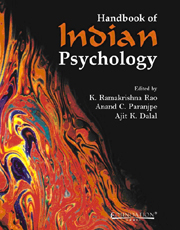Book contents
- Frontmatter
- Contents
- Contributing Authors
- Preface
- 01 Prologue: Introducing Indian Psychology
- 02 Indian Thought and Tradition: A Psychohistorical Perspective
- PART I SYSTEMS AND SCHOOLS
- PART II TOPICS AND THEMES
- PART III APPLICATIONS AND IMPLICATIONS
- 24 Therapeutic Psychology and Indian Yoga
- 25 Towards an Indian Organizational Psychology
- 26 Research on Indian Concepts of Psychology: Major Challenges and Perspectives for Future Action
- 27 Meditative Traditions and Contemporary Psychology
- 28 Consciousness Evolution of the Buddha until He Attained Satori
- 29 William James on Pure Experience and Samādhi in Sāṃkhya Yoga
- 30 Sri Ramaṇa Maharshi: A Case Study in Self-Realization
- 31 Altered States of Consciousness and the Spiritual Traditions: The Proposal for the Creation of State-Specific Sciences
- Pronunciation and Transliteration of Sanskrit Alphabet
- Glossary
- Index
31 - Altered States of Consciousness and the Spiritual Traditions: The Proposal for the Creation of State-Specific Sciences
from PART III - APPLICATIONS AND IMPLICATIONS
Published online by Cambridge University Press: 26 October 2011
- Frontmatter
- Contents
- Contributing Authors
- Preface
- 01 Prologue: Introducing Indian Psychology
- 02 Indian Thought and Tradition: A Psychohistorical Perspective
- PART I SYSTEMS AND SCHOOLS
- PART II TOPICS AND THEMES
- PART III APPLICATIONS AND IMPLICATIONS
- 24 Therapeutic Psychology and Indian Yoga
- 25 Towards an Indian Organizational Psychology
- 26 Research on Indian Concepts of Psychology: Major Challenges and Perspectives for Future Action
- 27 Meditative Traditions and Contemporary Psychology
- 28 Consciousness Evolution of the Buddha until He Attained Satori
- 29 William James on Pure Experience and Samādhi in Sāṃkhya Yoga
- 30 Sri Ramaṇa Maharshi: A Case Study in Self-Realization
- 31 Altered States of Consciousness and the Spiritual Traditions: The Proposal for the Creation of State-Specific Sciences
- Pronunciation and Transliteration of Sanskrit Alphabet
- Glossary
- Index
Summary
Like many modern Americans, I was raised with traditional Western religious beliefs (the Lutheran form of Christianity, in my case) that, as a child, I simply accepted. In my teenage years, as I both began to think for myself and became educated in science, I began to question most of these beliefs. Many people go through similar conflicts, and common ways of psychologically (but not fundamentally) resolving such conflicts are to either (1) completely reject religious and spiritual beliefs and become a materialist or (2) to dogmatically accept some religious beliefs but compartmentalize them, dissociate them in the mind from scientific ideas and findings which conflict with them. Both methods are psychologically costly, as they detract from wholeness.
I was fortunate in discovering and creating, in the course of my voracious reading, a more useful path that led toward more holistic resolution. One major source of this path was the scientific literature on psychical research and parapsychology, disciplines created by intelligent men and women who had gone through the same conflict between science and religion but, instead of taking one or the other extreme position of materialism or compartmentalized belief, decided to try applying the methods (not the then current findings) of science to the phenomenon of religion and spirituality.
- Type
- Chapter
- Information
- Handbook of Indian Psychology , pp. 577 - 607Publisher: Foundation BooksPrint publication year: 2008
- 1
- Cited by

